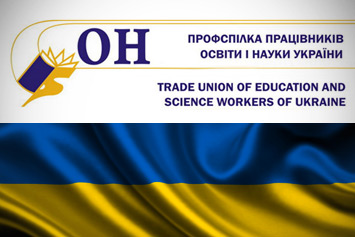New union headquarters a sign of hope for Ukrainian educators
Published:
With the help of financial solidarity support, educators in Ukraine once again have a home for their trade union and something to celebrate amidst the ongoing conflict that has divided the country. After their trade union offices in Kiev were burned to the ground a year ago during violent clashes between demonstrators and police, several hundred members of the Trade Union of Education and Science Workers (STESU) of Ukraine were left out in the cold with few options.
Today, progress is being made after the union sealed the deal on its new headquarters, paid for with the help of a solidarity fund established by Education International (EI) and its European region, the European Trade Union Committee for Education (ETUCE).
The President of the STESU, Georgiy Trukhanov, expressed appreciation on behalf of the union for the financial contribution in letters to both EI General Secretary Fred van Leeuwen and ETUCE Director Martin Rømer.
"Ukrainian teachers, students and the whole nation bear the burden of the consequences of the war, occupation and deep economic crisis caused by them. International solidarity and support showed us that we are not alone in this situation," wrote Trukhanov.
The solidarity fund was launched last March when EI and the ETUCE mobilised their membership to support their Ukrainian colleagues. That same month, EI led an international mission to Ukraine to assist the STESU in its search for new offices, and to help its own membership take action.
"Although Ukraine's educators are far from safe, and the country's conflict is far from over, the purchase of new headquarters will help the STESU respond to this difficult situation," said Rømer, adding that continued solidarity is needed to help the union tackle major challenges ahead.
The loss of its offices last February only compounded the obstacles facing the STESU, its educators, and the country of Ukraine. With a highly unstable political climate brought on by anti-government protests, and later the annexation of Crimea, the education sector was threatened by a proposed 20 percent budget cut, reduced salaries and an increase in work hours. However, the union prevailed in spite of the difficult environment, and the cuts were prevented.